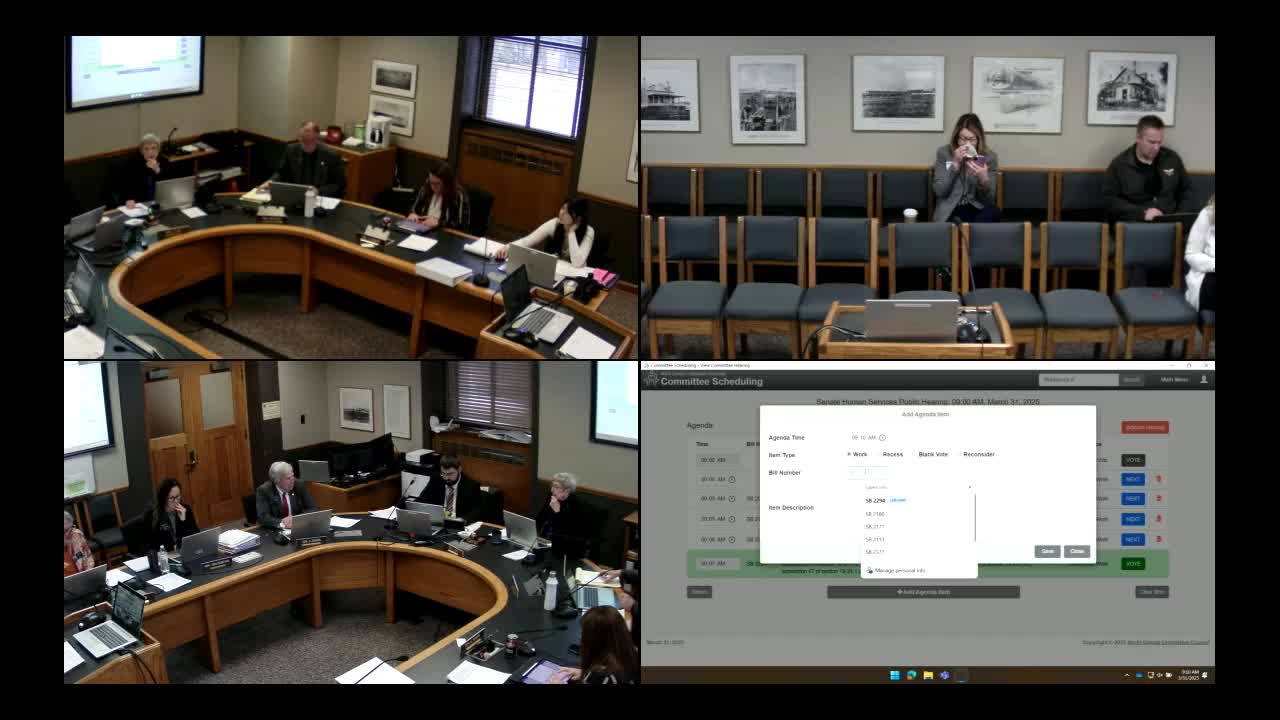Human Services committee moves to study gaps in care for children with severe behavioral health needs
Get AI-powered insights, summaries, and transcripts
Subscribe
Summary
The Human Services Committee discussed converting Senate Bill 1556 into a study overseen by the Children's Cabinet to identify placement and service gaps for children with serious behavioral health issues who also have juvenile‑court involvement.
The Human Services Committee discussed converting Senate Bill 1556 into a study overseen by the Children's Cabinet to address placement and service gaps for children with serious behavioral health problems who also have criminal charges or juvenile-court involvement.
Committee chair Senator Lee opened the discussion by asking whether members were ready to consider bill 1556 as a study. Senator Hogan, who led the conversation, said the bill “generated a lot of discussion” and that he was working with the Department of Health and Human Services and other parties “to draft converting this into a study initiative.” Hogan added that he planned to transfer the study responsibility to the Children's Cabinet and meet with the governor's office and the cabinet chair to seek a facilitator and scope for the work.
Why it matters: committee members and zone officials described immediate placement shortages for children with high-risk behaviors and said the current system can discharge youth from high-level programs without an alternative placement. Kim Jacobson of the Agassiz Valley Human Service Zone told the committee the zone directors “very much support the concept of a study” and that zones are seeing “more and more children with greater need.” Jacobson and other zone representatives are compiling case listings to show entry dates, charges and current placement status.
What the committee heard: members described cases ranging from aggravated assault and burglary to stabbing and an attempted-murder charge being placed or considered for placement in the child welfare system. A committee speaker said children being placed in zones include some as young as 13. Hogan said the group may find “40 similar situations” once data are collected, and warned that psychiatric residential treatment facilities in North Dakota can discharge youth without a documented alternative placement plan — a policy some members contrasted unfavorably with rules in other states.
Committee members and witnesses outlined several service gaps and possible options: expanding inpatient adolescent psychiatric capacity, building community-based programs similar to a Manchester program in Bismarck that several witnesses praised, reviving group-home–level treatment that has declined in recent years, and identifying whether funds set aside for other placements could be reallocated to alternatives. The committee noted the high cost of intensive long-term placements: a speaker described the per-person annual cost for some long-term developmental placements as about $500,000.
Next steps and timing: Hogan said he would meet at 11 a.m. with Children's Cabinet leadership and the governor's office and try to identify a neutral facilitator and a small working group (he suggested not more than eight people) to produce recommendations. Zone directors agreed to compile and submit a listing of youth now held in custody because of behavior-based referrals; one committee member asked whether that list could be ready by Wednesday and a zone representative said they would urge colleagues to complete it. Hogan said he would report back after meeting with the cabinet and governor's office.
What the committee did and did not do: members agreed informally to pursue the study route for 1556 and to develop reporting and possible six-month updates to Legislative Management on Human Services, but the record shows no formal roll-call vote on converting the bill to a study during this hearing.
Participants also urged caution about labeling parents or terminating parental rights as the primary mechanism for accessing care; Senator Weston raised concerns that terminating parental rights could harm rehabilitation prospects. The committee discussed existing legal mechanisms that allow direct parent placement without terminating parental rights and asked staff to compile data on recent admissions to the Long-Term Services Center (LSTC) and other high-level placements.
Ending: committee members agreed to continue the conversation in follow-up meetings and in a possible conference committee. Senator Hogan said he would coordinate with the Children's Cabinet and the governor's office and return with more concrete next steps after his scheduled meeting.
